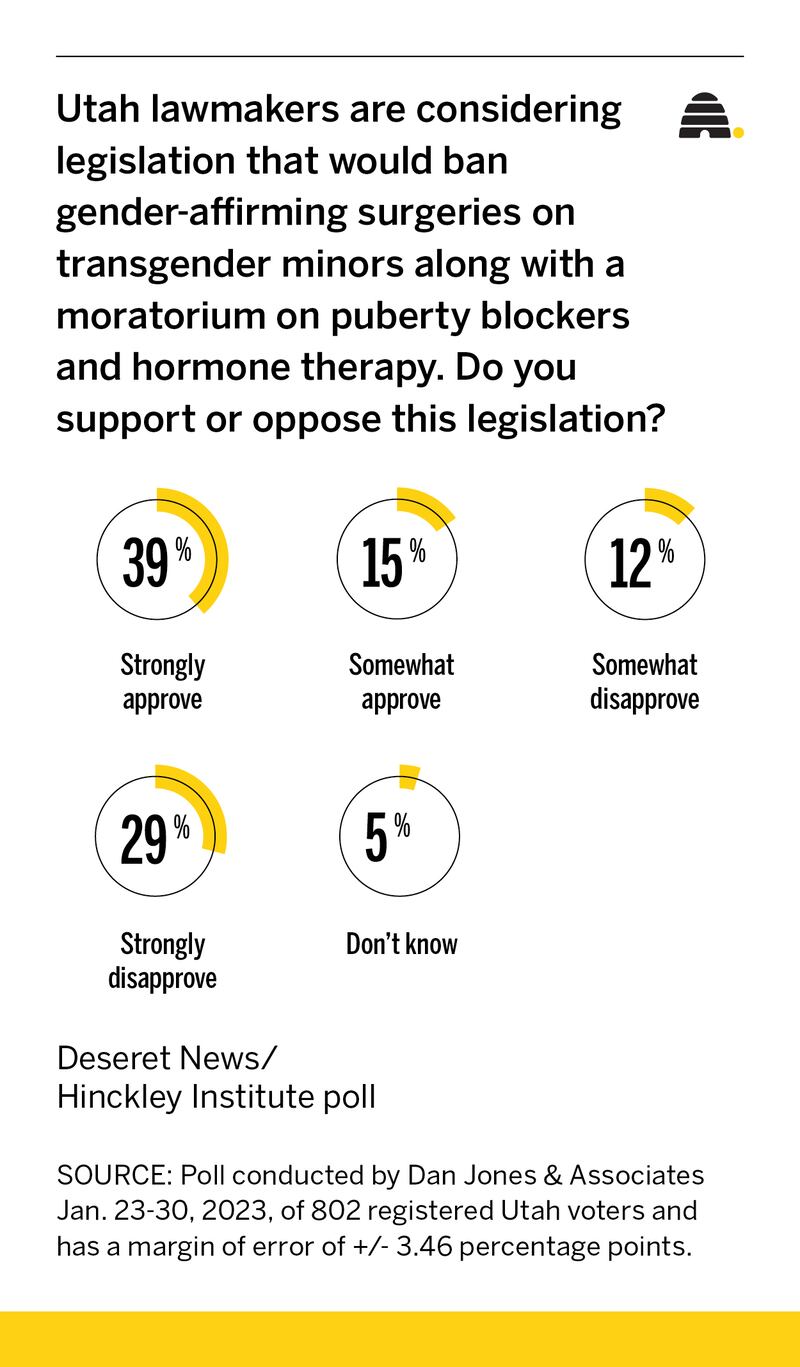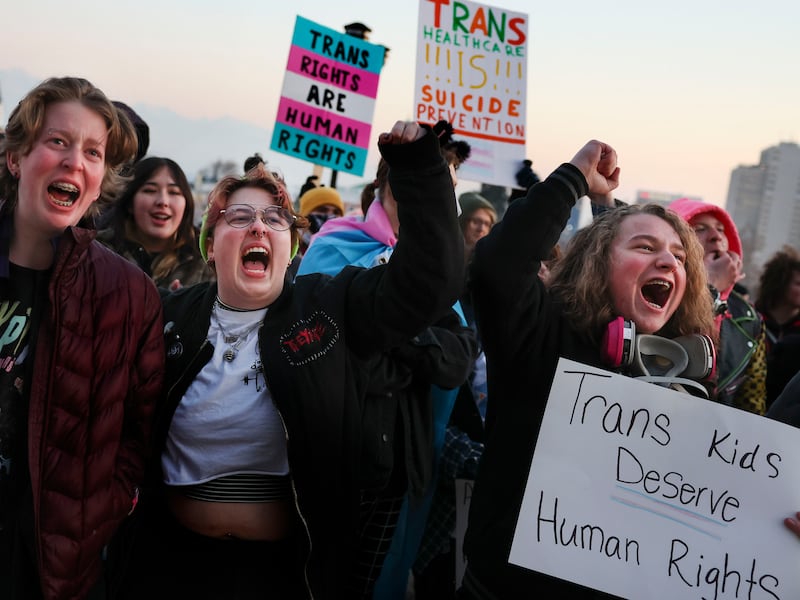A bill to ban transgender surgeries for Utah children and teens, as well as place an indefinite moratorium on new hormonal treatments for minors, was one of the first high-profile bills to make its way through the Utah Legislature this year.
On Jan. 28, the day after SB16 cleared its final legislative hurdle, Utah Gov. Spencer Cox signed the bill, saying even though it’s “not a perfect bill,” it brought a “nuanced and thoughtful approach to this terribly divisive issue.”
The move made Utah one of the first states this year to ban transgender health care for minors as conservatives across the nation grapple with transgender issues, particularly as they relate to children. It’s also headed straight to a court challenge, with LGBTQ advocacy groups promising to sue.
A majority of Utahns agree with the approval of SB16 — but a fair amount don’t, reflecting just how divisive the issue has been in the Beehive State.
That’s according to a new Deseret News/Hinckley Institute of Politics poll, which asked Utahns whether they support or oppose legislation that would ban gender-affirming surgeries on transgender minors along with a moratorium on puberty blockers and hormone therapy.
The survey found 54% of Utah voters strongly or somewhat approve of the bill, while 41% said they strongly or somewhat disapproved.
More specifically, 39% said they strongly approved, 15% said they somewhat approved, 12% said they somewhat disapproved, and 29% said they strongly disapproved. About 5% said they didn’t know what to think.

Surgeries and medications including puberty blockers and cross-sex hormones are among the medical treatments that transgender and nonbinary people sometimes use to transition or alter their sexual characteristics. Some medical professionals, as well as the American Academy of Pediatrics, say the best way to treat children and teens with gender dysphoria is to provide them with medical interventions often referred to as gender-affirming care.
Utah’s Republican-controlled Legislature, however, rallied behind SB16 to regulate transgender medical care for Utahns under 18, arguing Utah must step in and “protect” children because there is not enough research on the long-term impact of these procedures and medications on children.
Senate President Stuart Adams, R-Layton, said Tuesday the poll results show Utahns mostly “support what we did, and that’s kind of what I’ve heard from my constituents.”
Adams noted legislators were originally considering running two bills, one to deal with gender-affirming surgeries and another to deal with puberty blockers and cross-sex hormones, and he wondered how that would have impacted Utahns’ feelings about the legislation.
“I would have rather seen the items divided,” Adams said, adding some Utahns may have been more supportive of banning the surgeries and have more nuanced feelings about hormonal treatments.
Acknowledging the poll also shows a good chunk of Utahns weren’t supportive of the move, Adams said the poll shows it was a “tough issue,” but he said it still indicates most Utahns are aligned with the Legislature on this issue.
“That’s a pretty good spread,” he said.
Dan Jones & Associates conducted the poll of 802 registered Utah voters from Jan. 23-30, just as SB16 was making its way through the Legislature, and two days after the governor signed it. It has a margin of error of plus or minus 3.46 percentage points.
The survey found stark differences on the issue based on political party and ideology.
According to the poll, 65% of respondents who self-identified as Republicans support the new law, while 75% of those who identified as Democrats oppose it.
About three-fourths of Utahns who consider themselves very or somewhat conservative favor the bill. Moderates were more evenly divided, though nearly half support it. A large majority of respondents who described themselves liberal oppose the bill, including 95% of those who say they are very liberal.
Men were more in favor of the law than women, according to the survey.
It’s worth noting some nuances of SB16 changed after the House voted Jan. 26 to approve its own version of the bill.
That version, later approved by the Senate, implemented an immediate effective date and what LGBTQ advocates called a “de facto ban” on not just surgeries, but hormonal treatments for minor patients that hadn’t already been diagnosed with gender dysphoria before Jan. 28, the day it took effect when Cox signed it.
The House’s version also stripped out a four-year end date on the moratorium for hormonal treatments including puberty blockers or cross-sex hormones for new patients.
In response to the poll results, Troy Williams, executive director of Equality Utah, told the Deseret News “all Utahns desire the well-being of children.”
“We want to ensure that parents with transgender children have the freedom to seek medical care consistent with scientific and medical best practices,” he said. “The government should not be meddling in the private medical decisions of Utah families, so long as those medical practices are consistent with the mainstream standards of care.
“As more Utahns get to know their neighbors with transgender children, and learn about their hopes and fears, we expect views and attitudes will continue to shift,” Williams said.
LGBTQ advocacy organizations including the Trevor Project say children and teens who identify as transgender are much more likely to struggle with suicidal ideation. They are also more often diagnosed with depression and anxiety, according to studies published in the Journal of Adolescent Health.
Lawmakers advanced SB16 after two separate public hearings where they heard personal stories of both the harm and benefits of transgender medical procedures.
Parents of transgender children — and transgender teens — advocated for the freedom to make medical decisions with their doctors, while some bill supporters including Chloe Cole, an activist from California who has described herself as a “former trans kid,” told graphic accounts of lasting physical damage from past procedures.
In response to the poll results, the bill’s House sponsor, Rep. Katy Hall, R-South Ogden, called the law a “measured and nuanced approach to the treatment of transgender minors.”
“It is the result of several months of thoughtful conversations with stakeholders to do what is best to protect our children,” Hall said. “I hope we can continue working together to provide our struggling children with the love and care they need to grow and thrive.”


